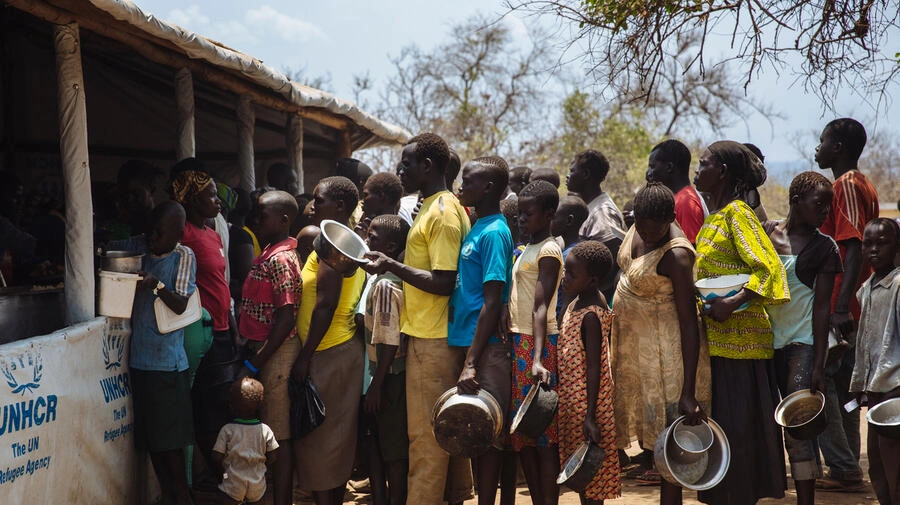Uganda’s refugee crisis deepens as aid dwindles, and tensions rise in settlements

South Sudanese refugees queue for food at a reception centre in Arua, in northern Uganda. © HCR/David Azia
As global attention shifts elsewhere, a silent emergency is unfolding in Uganda’s refugee settlements, where aid cuts are pushing already vulnerable communities to the brink.
Nakivale Refugee Settlement, one of the oldest and largest in Uganda, is rapidly descending into crisis. Once vibrant community gardens now lie abandoned, youth programmes have stalled, and a growing sense of desperation grips the population. With more than 1.8 million refugees hosted across the country including over 143,000 new arrivals this year, Uganda’s lauded open-door policy is now straining under immense pressure.
“What we are witnessing in Nakivale is extremely concerning,” says Renate Kavira, Acting Executive Director of TUMAINI, a refugee-led organisation based in the settlement. “There is heightened tension and growing distress among residents. A sense of hopelessness and frustration is spreading as the gap between needs and available support continues to widen.”
Kavira notes that the aid cuts are disproportionately affecting the most vulnerable groups: single mothers, child-headed households, and people living with chronic illnesses. With limited resources being redirected to support new arrivals, long-term residents are increasingly left behind.
Reports of depression, petty theft, and even violence are rising. Local sources say a woman was allegedly beaten to death in a food-related dispute an incident that, while unconfirmed, underscores the seriousness of the situation.
Hunger and mental health in sharp focus
Parents skipping meals so their children can eat is becoming a common survival tactic. At the same time, aid groups report a sharp uptick in mental health concerns. But with psychosocial support services also suffering from funding cuts, few resources remain to address the growing emotional toll.
The strain is not just material; it’s psychological. War Child Alliance and other organisations operating in the settlement say distress levels among youth and families are reaching alarming levels. “Without mental health and psychosocial support, we are creating a long-term crisis that won’t end when the food comes back,” said one aid worker.
Uganda’s Education Gains Under Threat
Education long viewed as a cornerstone of Uganda’s progressive refugee policy is now under serious threat. UNHCR reports that pupil-to-teacher ratios have ballooned from an already high 77:1 to a staggering 207:1, well above the national standard of 53:1. Hundreds of teachers have lost their jobs due to shrinking budgets, and schools are struggling to remain open.
While some refugee children attend government-run schools, many are enrolled in underfunded community or private institutions now teetering on collapse. Programmes that once offered scholarships, school materials, and remedial classes are being cut.
“We don’t believe in lost generations but the risk is real,” says Parwez Anis, War Child Alliance’s Country Director for Uganda. “We’re doing everything we can to keep our programmes going, including ‘Can’t Wait to Learn,’ but if this trend continues, we simply won’t be able to.”
A crisis at risk of being forgotten
Uganda’s refugee response has long been hailed as a model for the region, with its inclusive policies and integrated settlements. But as global priorities shift and donor fatigue sets in, those very principles are now under threat.
“What we’re facing is a chronic underfunding crisis, not just a short-term emergency,” Kavira explains. “If the world turns its back now, we will see even more hunger, school dropouts, and mental health issues. And it’s the most vulnerable children, the elderly, single parents who will suffer the most.”
War Child Alliance and grassroots groups like TUMAINI are calling for an urgent reversal in funding trends. They say immediate international support is needed to stabilise food supplies, expand psychosocial services, revive education programmes, and invest in livelihoods that restore dignity and reduce dependency.
“The cracks are widening,” warns Anis. “Without action now, we are not just looking at a humanitarian crisis; we’re watching hope fade from an entire generation.”




